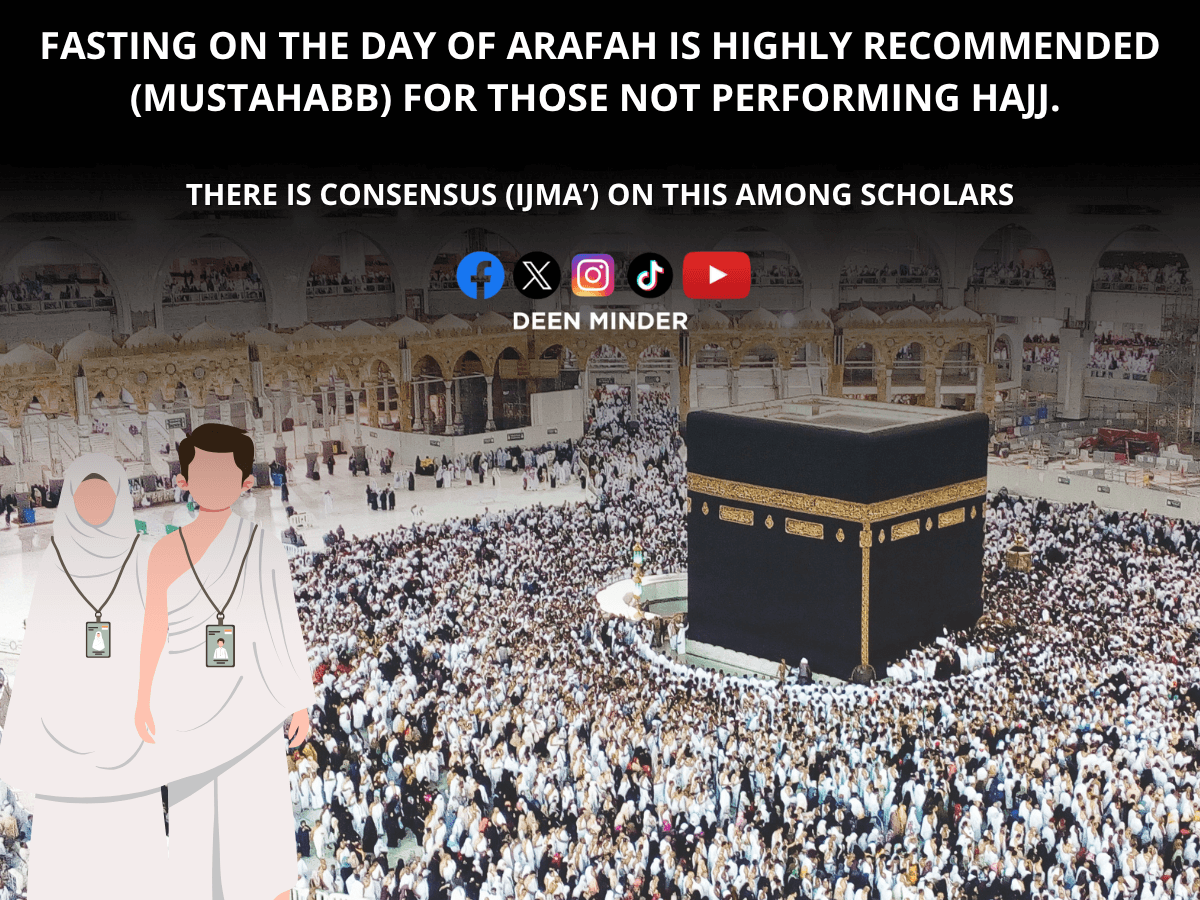In the sacred days of Dhul-Hijjah lies the Day of Arafah (Yaomul Arafah). For those who do not perform Hajj, fasting on Arafah is one of the greatest acts of worship you can offer on that day. Let’s explore the authentic Hadith on fasting on the day of Arafah, as narrated from our Messenger of Allah ﷺ.
Hadith on fasting on the day of Arafah (Arabic)
عَنْ أَبِي قَتَادَةَ عَنْ النَّبِيِّ صَلَّى اللَّهُ عَلَيْهِ وَسَلَّمَ سُئِلَ عَنْ صَوْمِ يَوْمِ عَرَفَةَ فَقَالَ يُكَفِّرُ السَّنَةَ الْمَاضِيَةَ وَالْبَاقِيَةَ وَسُئِلَ عَنْ صَوْمِ يَوْمِ عَاشُورَاءَ فَقَالَ يُكَفِّرُ السَّنَةَ الْمَاضِيَةَ
1162 صحيح مسلم كتاب الصيام باب استحباب صيام ثلاثة أيام من كل شهر وصوم يوم عرفة وعاشوراء والاثنين والخميس
Hadith on fasting on the day of Arafah (English)
It was reported from Abu Qatadah that the Prophet ﷺ was asked about fasting the day of ‘Arafat, and he said, “It will expiate the sins of the previous and upcoming years.” Then, the Prophet ﷺ was asked about fasting the day of ‘Ashura, and he said, “It will expiate the sins of the past year.”
Muslim 1162
Explanation of the hadith on Yaomul Arafah
This Hadith on fasting on the day of Arafah is narrated authentically in Sahih Muslim by Abu Qatadah (رضي الله عنه). The Prophet ﷺ emphasized the incredible reward of fasting on the day of Arafah for those who are not at Hajj. He ﷺ said that Allah will forgive two years’ worth of sins, the past year and the upcoming one, just for one day of sincere fasting.
Can you imagine? Just one day of fasting on Arafah with sincerity, love for Allah, and yearning for His forgiveness wipes out a whole year’s sins behind you and another one ahead of you. This means that fasting on the day of Arafah (Yaomul Arafah) carries great virtue in Islam, especially for those who are not performing Hajj. Scholars commented on the type of sins that this reward covers, which goes thus…
Imam Nawawi رحمه الله said:
“This refers to minor sins; as for major sins, they require sincere repentance.” [Sharh Sahih Muslim, Nawawi]
Is fasting on the Day of Arafah compulsory or just recommended?
It is highly recommended to observe the fasting on Arafah, but it is not compulsory (fard). There is no sin upon a person who misses the fast of Arafah, but they will certainly be missing out on the massive reward.
Imam An-Nawawi رحمه الله said in Sharh Sahih Muslim:
“Fasting on the Day of Arafah is highly recommended (mustahabb) for those not performing Hajj. There is consensus (ijma’) on this among scholars.”
Similarly, Sheikh Ibn Baaz رحمه الله explained:
“It is not obligatory to fast on Arafah, but it is a Sunnah Mu’akkadah. One who fasts it hoping for reward will have their sins forgiven for the previous year and the year to come.”
Also, Ibn Taymiyyah رحمه الله stated:
“Fasting on Arafah is one of the best voluntary fasts in the year. It is not obligatory, but its reward is tremendous.”
Why is it not compulsory?
If it were obligatory, our Prophet ﷺ would have commanded us to observe it every year, and there would be sin on us if we neglect it. But he never ordered it as a must, instead, he praised its reward and consistently practiced it too for us to follow his path, except during Hajj.
There is another hadith on fasting on the day of Arafah narrated by Hafsah bint Umar رضي الله عنها, one of the noble wives of our Prophet ﷺ, that affirms that our Prophet was consistent in observing this fasting.
“The Prophet ﷺ used to fast Ashura, Arafah, and three days every month, and he never abandoned them until he died.” Reported in An-Nasa’i (2416), classed as Sahih by Sheikh Albani
The above authentic hadith on Yaomul Arafah confirms that fasting on Arafah was not a seasonal or occasional Sunnah. Rather, it was a consistent Sunnah of the Prophet ﷺ. SubhanAllah, when the wife of the Messenger ﷺ says he never neglected it, what does that say to us? His consistent practice confirms the high status of fasting on Arafah.
Should we take this day lightly? Should we be casual about a fast that the Prophet ﷺ personally loved, which he never missed, and which he told us that it erases two entire years of sin? No one will ever want to miss this.
Other reasons to observe fasting on the day of Arafah
The Day of Arafah is not an ordinary day. The hadith on Yaomul Arafah tells us that it is the best fast of the year to seek forgiveness and mercy. But what are the other reasons why fasting on Arafah carries such an extraordinary reward, except for two years of sin expiation?
1. It acts as a shield against sins
Fasting weakens desires and strengthens self-restraint, acting as a spiritual barrier against disobedience. There’s no doubt that fasting is one of the strongest means to curb desires and control oneself. It shields a believer from falling into sin.
“Fasting is a shield…” (Sahih Bukhari)
So fasting on the day of Arafah does not only wipes out sins, it also acts as a spiritual firewall against sinning on this day and future sinning. The act itself builds inner strength, deepens taqwa, and distances one from disobedience.
2. It draws you closer to Allah
Fasting is one of the most beloved deeds to Allah, and our Prophet ﷺ said in a Hadith Qudsi:
“Allah says.. my servant draws near to Me with nothing more beloved to Me than the obligations I have imposed upon him. Then he continues to draw near to Me with voluntary deeds until I love him…” (Sahih Bukhari 6502)
Fasting on Arafah is a voluntary act that is beloved to Allah. And what happens when Allah loves you? The Hadith continues that:
….My slave keeps on coming closer to Me through performing Nawafil (praying or doing extra deeds besides what is obligatory) till I love him, so I become his sense of hearing with which he hears, and his sense of sight with which he sees, and his hand with which he grips, and his leg with which he walks; and if he asks Me, I will give him, and if he asks My protection (Refuge), I will protect him; (i.e. give him My Refuge) and I do not hesitate to do anything as I hesitate to take the soul of the believer, for he hates death, and I hate to disappoint him.” (Sahih al-Bukhari, 6502)
Fasting on Arafah, therefore, is a door to earning Allah’s love.
3. You earn the reward for performing a good deed in one of the best ten days on earth
Fasting on the day of Arafah falls on the first ten days in the month of Dhul Hijjah, and one of the virtues of these first ten days is that they carry the best reward for any good deed performed in them than any other days.
“No good deeds done on other days are superior to those done on these first ten days of Dhul Hijjah.” Then some companions of the Prophet (ﷺ) said, “Not even Jihad?”
He replied, “Not even Jihad, except that of a man who does it by putting himself and his property in danger (for Allah’s sake) and does not return with any of those things.” (Sahih al-Bukhari 969)
Based on today’s hadith on fasting on the Day of Arafah, we are able to see the benefit and rewards of observing this fasting and how it is a means for every believer who yearns to draw closer to Allah to make good use of this day in fasting.
Should pilgrims fast on Arafah Day during Hajj?
While this hadith on fasting on the Day of Arafah didn’t specify whether those who are performing Hajj should observe it or not. We are going to look into another hadith that made it clear that it is not recommended for the oilgrims to fast on this day. It was narrated by Umm al-Fadl رضي الله عنها that
“While the people were with me on the day of `Arafat they differed as to whether the Prophet (ﷺ) was fasting or not; some said that he was fasting while others said that he was not fasting. So, I sent to him a bowl full of milk while he was riding over his camel and he drank it.” (Sahih al-Bukhari, 1988)
This authentic Hadith made it clear that our Prophet ﷺ did not fast on Arafah during Hajj. Despite the tremendous reward for fasting on Arafah, the hadith on Yaomul Arafah shows that pilgrims are exempted, and this act of fasting was a prophetic Sunnah for those not in Hajj. Besides, the pilgrims can easily get exhausted if they fast on this day, due to a lot of acts of worship they will engage in on this day
Dear brothers and sisters in Islam, the hadith on fasting on the Day of Arafah is not just to be read but to be acted upon. The rewards are too tremendous to just ignore or disregard it. We ask Allah to make us among those who will be freed from the Hellfire on the Day of Arafah.
We ask Him to accept our fasting, forgive our sins, and grant us humble hearts and tongues that remember Him. Aameen


